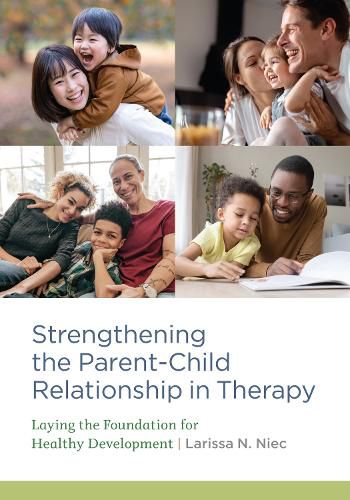Readings Newsletter
Become a Readings Member to make your shopping experience even easier.
Sign in or sign up for free!
You’re not far away from qualifying for FREE standard shipping within Australia
You’ve qualified for FREE standard shipping within Australia
The cart is loading…






The most important thing a psychologist can do to foster a child’s well-being is to help build a healthy, effective parent-child relationship.
The relationship between a child and their primary caregiver(s) is the cornerstone of child development. Interactions in early childhood initiate a developmental cascade that impacts an individual’s functioning throughout childhood, adolescence, and into adulthood.
This book integrates the basic and applied literature with the concrete, evidence-based strategies and empirically-supported interventions mental health providers need to help build and strengthen the parent-child relationship.
It has long been understood that the quality and effectiveness of the parent-child relationship influences children’s emotional, behavioral, and physical health. Today, studies increasingly demonstrate that the parent-child bond influences the relation between socioeconomic status and child functioning, and that increasing parenting effectiveness can even decrease the negative impact of poverty on children’s brain development.
With clinical case examples and lists of key takeaways and questions for clinicians to consider, this book provides the practical guidance mental health practitioners need when working with parents and young children.
$9.00 standard shipping within Australia
FREE standard shipping within Australia for orders over $100.00
Express & International shipping calculated at checkout
The most important thing a psychologist can do to foster a child’s well-being is to help build a healthy, effective parent-child relationship.
The relationship between a child and their primary caregiver(s) is the cornerstone of child development. Interactions in early childhood initiate a developmental cascade that impacts an individual’s functioning throughout childhood, adolescence, and into adulthood.
This book integrates the basic and applied literature with the concrete, evidence-based strategies and empirically-supported interventions mental health providers need to help build and strengthen the parent-child relationship.
It has long been understood that the quality and effectiveness of the parent-child relationship influences children’s emotional, behavioral, and physical health. Today, studies increasingly demonstrate that the parent-child bond influences the relation between socioeconomic status and child functioning, and that increasing parenting effectiveness can even decrease the negative impact of poverty on children’s brain development.
With clinical case examples and lists of key takeaways and questions for clinicians to consider, this book provides the practical guidance mental health practitioners need when working with parents and young children.